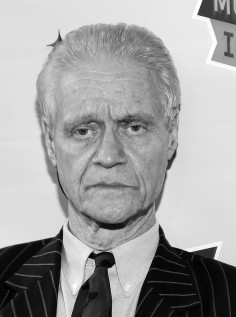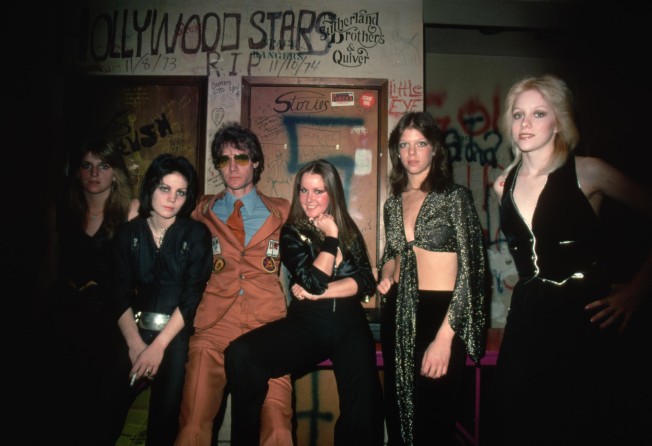
Kim Fowley: icon of sex, sleaze and all-round weirdness in LA rock'n'roll
Kim Fowley is best known as founder of all-girl band The Runaways, but he had all of his fingers in the LA musical pie as a songwriter, producer and more

Those looking to understand Kim Fowley's philosophy of rock'n'roll salesmanship can get a sense by how he described hawking songs in Los Angeles in the early 1960s, when he was a twenty-something hipster/huckster looking to make a mark.
Fowley, who died on January 15 at age 75, was speaking to writer Barney Hoskyns for his book on Los Angeles pop music, Waiting for the Sun. Recalling his early years in what Hoskyns dubbed the "capitalism a go-go" music scene at the dawn of the rock'n'roll era, Fowley described thriving at the epicentre of the ultimate seller's market.
"You could sell any tape for US$100, and there was no playing clubs for guys in suits," Fowley said, his recollections peppered with an unprintable curse word. "We were kids running amok in studios like rappers do now, except the rappers have attorneys. We were all thieves - there was no [expletive] … about art or integrity or sensitivity. People were willing to pay us to do … and keep doing it, and we were addicted to the process."
The songwriter, producer, talent scout and charismatic symbol of Los Angeles musical weirdness used that process to build an anarchic body of work. Many were novelty hits, a few great, others either forgettable or just terrible. Most infamously, Fowley formed the all-girl rock band The Runaways, a relationship that delivered fame and success for the band while confirming his avowed sleaziness.
The band's Cherie Currie, for example, accused him of holding a "sex education class" for some of the teenage girls - a charge Fowley denied. In her memoir Neon Angel, which served as the source material for the 2010 Runaways movie starring Kristen Stewart and Dakota Fanning, Currie wrote of how Fowley had sex with a woman in front of the band to "teach you dogs how to [have intercourse]".
"It's like battered-wife syndrome," Currie said in a 2010 interview with Spin magazine. "Some women love the abusive men they're with and that's kind of the way I was with Kim. I really wanted his approval. And he apologised to me on the phone a year ago, saying if he had to do it over again he wouldn't have treated us that way. He didn't know how to handle 15-year-old girls. In his own crazy way, he loved us."
Currie once called Fowley a "beast who should not be allowed near young girls" - yet she took in the ageing Fowley when he was battling bladder cancer. The two reconciled in 2008, much to the surprise of journalists who had covered both individuals for years, after Currie learned about Fowley's condition. Last August, she moved him into her home to care for him.

On a larger scale, Fowley helped birth a certain hipster archetype that endures to this day: the tapped-in, super-clever kid who understands youth culture and is keen to get in on the action.
Fowley was a connector looking for the next big thing. He had a taste for loose, raucous rock'n'roll and a confidence that he was right, even if his discography offers ample evidence of his many failures.
Fowley revelled in being the bad guy. His business model was similar from the start: record music using unknown bands in by-the-hour studios and then pawn the songs. If it didn't hit, discard the band and song and try again. Indie labels were desperate for records to feed the dozens of independent Southern California distributors shipping product across America.
Fowley bottled a wild mix of rebelliousness, especially in the 1960s and '70s. Of the hundreds he had a hand in, he peddled songs about a student's come-on to a sexy teacher ( Hello Schoolteacher, by the Four After Fives); an instrumental guitar ode to underwater life, Atlantis, replete with the sound of bubbles flowing through water; Big Fat Alaskan as recorded by Donnie & the Outcasts, a first-person ditty about said northerner, who rides a polar bear and wears a black seal coat but can't stand the cold and so is moving to California.
Many of Fowley's solo records remain as mysteriously engaging now as when they came out. (Some of his best early songs and productions can be found on Norton Records' excellent multi-volume series of Fowley's work, aptly called One Man's Garbage.)
He chased trends his entire life, his lanky frame moving from the early Southern California surf scene through the British invasion and leading the parade for the Sunset Strip sound of the mid-1960s. As singular as he was fashionable, Fowley was fab during the Byrds years, ran and recorded with Frank Zappa, and served as MC in a John Lennon-produced "rock'n'roll revival". The artist went glam during the Bowie years, wrote hits for KISS, pushed new wave when it mattered.
Most recently, Fowley served as muse and adviser to kindred spirit Ariel Pink on the latter's Pom Pom.
We were kids running amok in studios like rappers do now, except the rappers have attorneys. We were all thieves – there was no [expletive] … about art or integrity or sensitivity
He exaggerated history and his role in it, and his competitiveness knew no bounds. Music mogul Lou Adler described to Hoskyns an encounter with Fowley: "I once made him open up his suitcase, and there was nothing in it, which sums him up."
Evelyn McDonnell, in her biography of The Runaways, Queens of Noise, called Fowley "an appalling character. That appal is part of his appeal".
Fowley agreed. "I'm everybody's worst nightmare and somebody's wet dream. I'm a horrible human being with a heart of gold, or a piece of … in a bag of diamonds. I'm a bad guy who does nice things, as opposed to a nice guy who does bad things."
Those claims may be accurate, but who ever said that rock'n'roll was pretty?
It certainly wasn't the man who, in 1967, released The Worst Record Ever Made, which featured Fowley in front of the microphone pondering terrible music with a group called Althea & the Memories. Midway through, after suggesting a dance called "the wheelchair", Fowley goes meta, complaining about screaming into a microphone for the length of a song. "It's pretty hard," he says, before listing a pair of truths that guided him: "It shows how desperate we all are. And it shows how desperate you are to be listening to this."
When he died earlier this month, Currie wrote on her Facebook page: "Just before 8am this morning, January 15, 2015, Kim Fowley passed away at his home with his wife, Kara Wright, by his side after a long battle with cancer. He was 75 years old.
"I am so blessed that I had the chance to know you again Kim … really get to know you on a personal level and that we became friends. Mostly that you spent time here at my home. It's a time I will never forget. The last record you made is in good hands and I am so glad that record is mine. It was a pleasure.
"Thank you for starting my career when I was just a child. You were instrumental in so many getting started in this crazy world of music. You are a genius … you are loved. You will be so missed. Rest in peace my friend."
Los Angeles Times, with additional reporting by The Washington Post